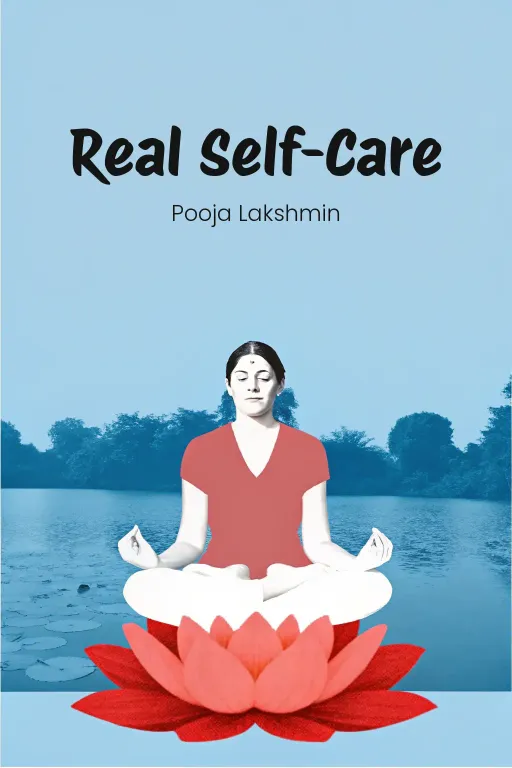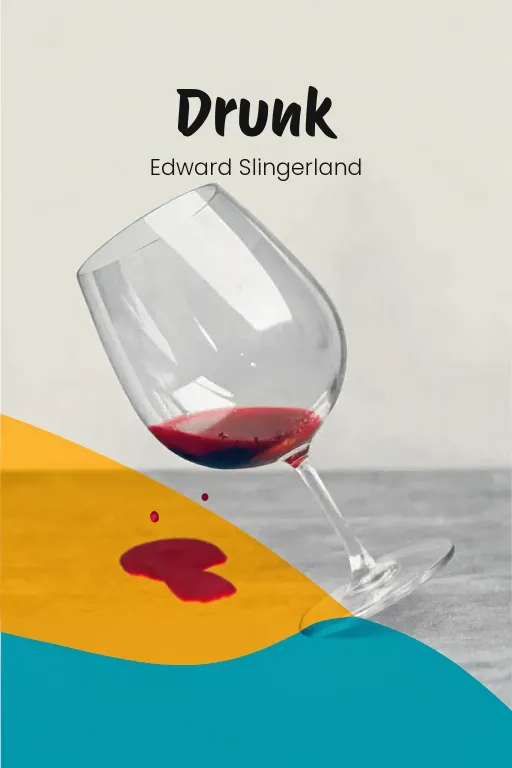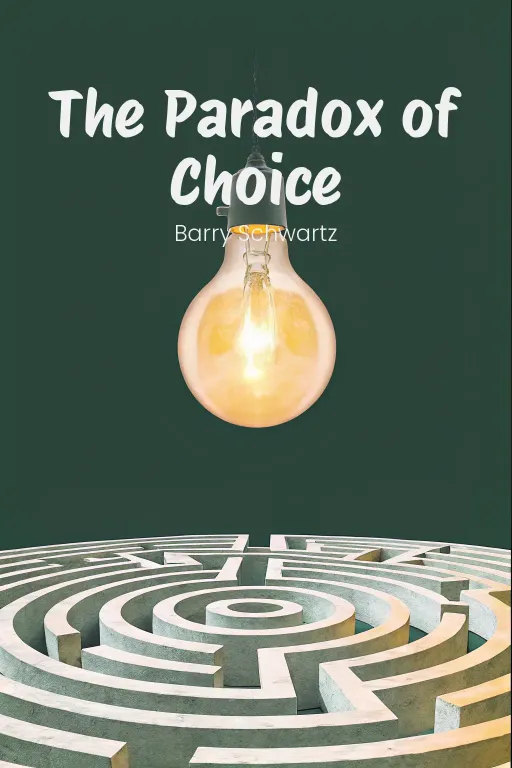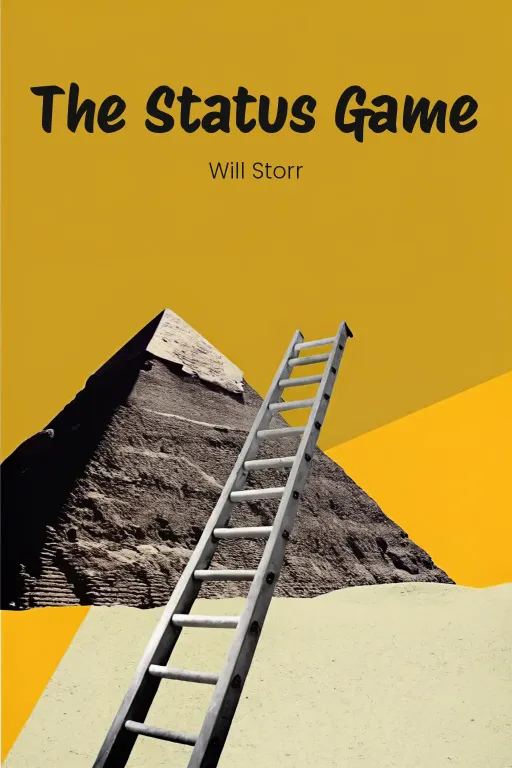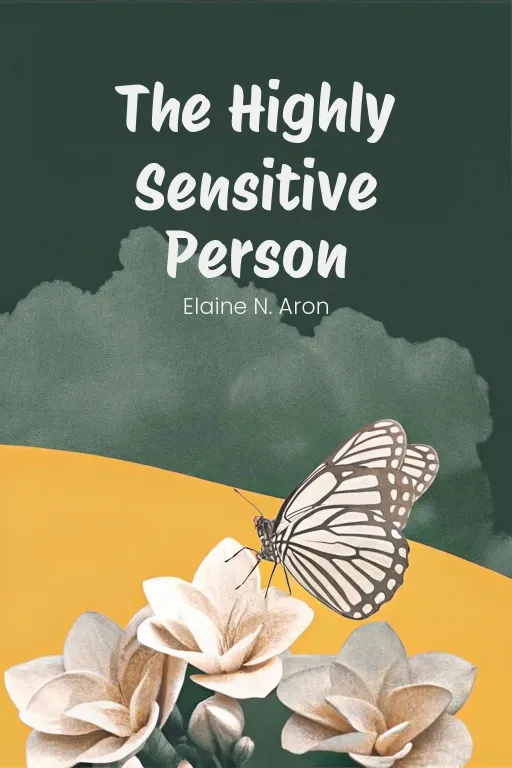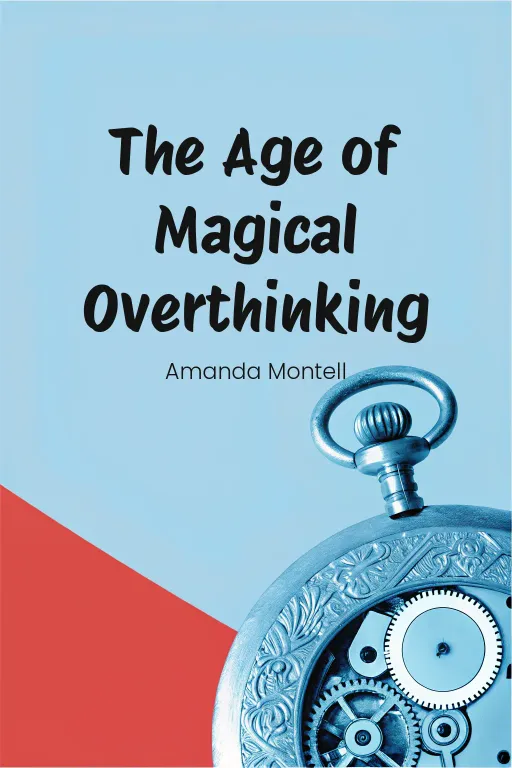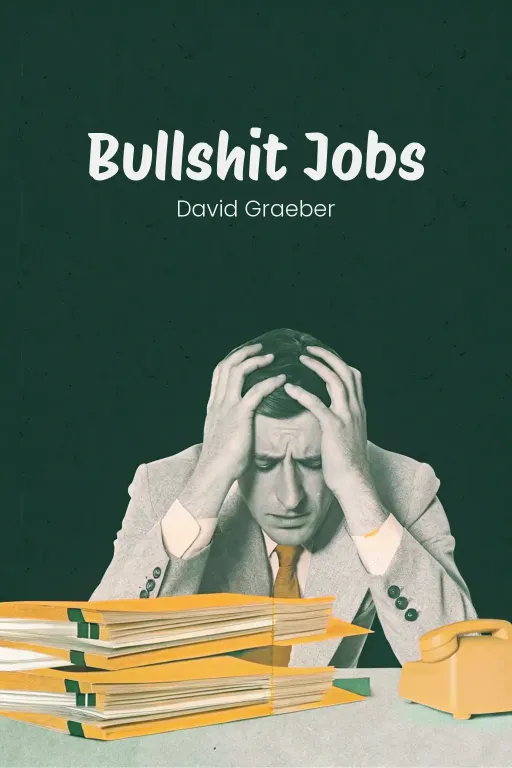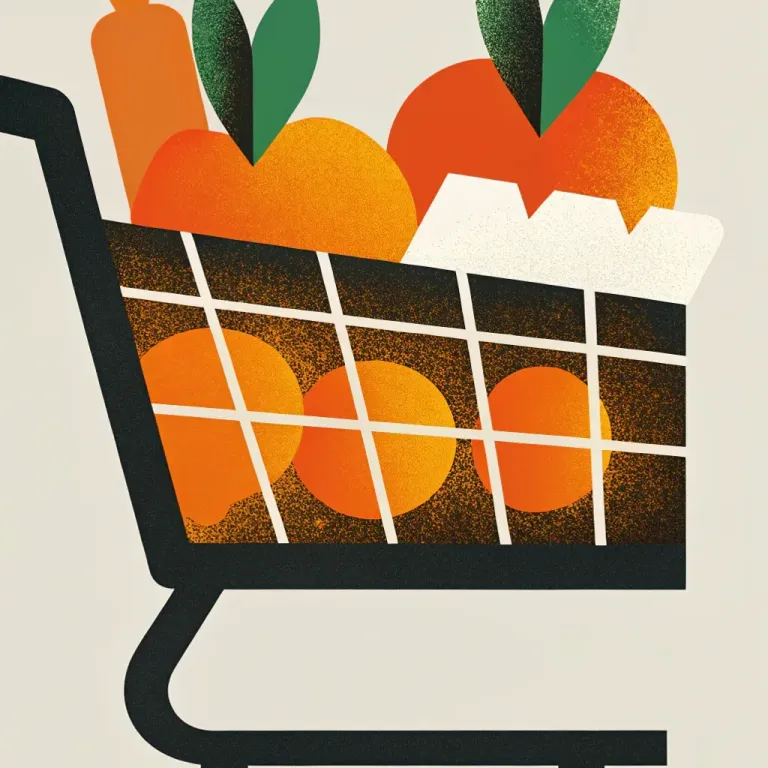
Escape the Choice Trap
Podcast by The Mindful Minute with Autumn and Rachel
Why More Is Less
Escape the Choice Trap
Part 1
Autumn: Ever find yourself staring blankly at a grocery store shelf, paralyzed by the sheer number of peanut butter options? Crunchy, creamy, organic, low-fat… the list goes on! It feels like having choices should be empowering, but sometimes it’s just… exhausting, right? Rachel: Oh, absolutely. I’ve been there. I mean, who knew buying peanut butter could feel like facing an existential dilemma? But seriously, isn’t choice supposed to be a good thing? More options should equal more happiness, shouldn't it? Autumn: Well, that's exactly what Barry Schwartz questions in his book, “The Paradox of Choice: Why More Is Less.” He argues that while having choices gives us freedom and control, the overabundance of options we face today often backfires. It can leave us feeling overwhelmed and, ironically, less happy with whatever we end up choosing. Rachel: Ah, I think I see where you're going with this. Sounds like a classic case of "grass is greener" syndrome? Autumn: Precisely! Schwartz really gets into the psychology of decision-making, introducing us to "maximizers"—people who stress about making the absolute best choice—versus "satisficers," who are happy with something that's simply good enough. A maximizer might find the perfect pair of sneakers, but at what cost to their mental well-being, you know? Rachel: Okay, so this is bigger than just peanut butter; this is like a whole philosophy on modern life. Autumn: Exactly! Today, we're going to explore three key ideas from Schwartz's book. First, we'll look at how endless choices can overwhelm us and even stop us from acting. Second, we'll dive into the difference between maximizers and satisficers, and how those mindsets affect our happiness. And finally, we’ll talk about strategies for navigating all these decisions without losing it completely. Rachel: Alright, I'm intrigued… and maybe just skeptical enough to keep you honest. Let's get into it.
The Paradox of Choice
Part 2
Autumn: Okay, so let's dive right into the core of Schwartz's argument: the paradox of choice. It's basically the idea that while we value having options, all those choices can actually make us feel stressed and overwhelmed. He shows this really well when he talks about shopping for jeans at The Gap. Rachel: Ah yes, “the jeans crisis!” I definitely remember that. It’s so relatable. But for those who haven’t read it, what exactly was his problem? Autumn: Sure! Back in the day, buying jeans was easy. You only had a couple of styles. But at The Gap, Schwartz was faced with tons of options – bootcut, slim-fit, relaxed, you name it! And the salesperson kept asking about every little detail: rise, wash, stretch. In the end, he got “the best-fitting pair of jeans he’s ever owned,” or so he says. Rachel: Sounds good so far. Doesn't seem so bad, right? Autumn: Exactly! But instead of being happy, he felt worse! He couldn't stop wondering if there was an even better pair he missed. That's the paradox – too many options make you second-guess yourself and feel regret. Rachel: Okay, hold on. Here’s where I get a little practical. Jeans-shopping regret sounds like a first-world problem! Does it really have a big psychological impact? Autumn: I get it. It might seem silly. But Schwartz uses that as a way to explain what happens with almost every decision we make. It's not just jeans or peanut butter – it's careers, relationships, even healthcare. When every choice feels like you might make a mistake, it's tough on your mental health. Rachel: I see. So, it's not just about the choice itself – jeans versus bread – but the sheer mental effort of sorting through everything. Autumn: Exactly. Schwartz links this to “decision fatigue.” When you have endless choices, you spend more energy trying to figure things out. Even small decisions become exhausting. And you're more likely to regret your choice because you keep comparing it to other options. Rachel: So, ironically, the promise of choice—better options, custom experiences—has kind of turned into a trap. Autumn: Precisely. And Schwartz uses a cool experiment about jam to prove it. Researchers set up a table at a supermarket with two scenarios: one with 24 jam flavors, and another with only 6. Guess which table sold more? Rachel: Hmmm, let me guess... the one with 6, right? Autumn: Bingo! People at the smaller table were ten times more likely to buy jam. The idea is that too many choices can freeze us. It's strange, but simpler really is better. Rachel: Okay, I get it – those jam jars make a good point. But now I'm wondering, is it really just about having too many choices? Or is there something more going on? Is it about the number, or how we think about them? Autumn: Great question! It’s a bit of both. The sheer volume of choices creates “choice overload,” as Schwartz calls it. But then there's the hidden cost – opportunity. We get hung up on all the roads we didn't take. Rachel: So, even if you pick something good, you're haunted by the “better” option that might have been. Autumn: Exactly! The “ghost of better jeans,” if you will. Schwartz says that feeling of missed opportunity makes us less happy. And it's made worse by things like cultural norms, especially here, where we connect freedom of choice with being successful. Rachel: Right, like how we’re told, “You can be anything, do anything, go anywhere.” On one hand it is empowering, while on the other hand, it implies that “If you’re not happy, it’s because you picked wrong.” That’s heavy. Autumn: Totally. That's why Schwartz calls it “the tyranny of choice.” We feel like we have to optimize every decision – always pick the “perfect” choice – which makes us anxious, hard on ourselves, and even unable to act. And if we don’t watch out, it affects society too, from how we shop to how we choose our careers. Rachel: Speaking of careers, I see this happening at work all the time. Young professionals stressing over every job offer thinking, “What if there's something better out there?” Same deal as the jeans, just bigger scale. Autumn: Definitely. Schwartz points out how this is amplified in areas like college education, where students face all of these electives and majors. Flexibility is great, but it also creates the fear of picking the wrong path. Rachel: And social media definitely doesn’t help. Everybody's showing off their “perfect” choices, you know? Constantly reminding us of the alternatives – what we could've had, what others have found, what we might be missing. Autumn: Exactly. The fear of regret and endless comparison make the problem worse. What’s cool, though, is that Schwartz doesn’t just point out the problem, he calls for a bigger rethink of how society works. Rachel: Alright, but here's my skeptical side again: is that even possible? How do you “rethink” a culture that's all about having endless choices?
Maximizers vs. Satisficers
Part 3
Autumn: That's a valid point, Rachel. But, Schwartz actually argues that it's all about how we “process” these choices. He introduces two profiles: maximizers and satisficers. These are basically two fundamentally different ways we deal with having so many options, and, get this, they have a massive impact on our happiness levels. Rachel: Okay, so, break it down for us. What's the key difference between a maximizer and a satisficer? And, more importantly, am I a maximizer? I have a feeling I already know the answer to that one. Autumn: Right, so let’s start with maximizers. These people, they want the absolute “best” in every single decision. Like, whether it's buying a new jacket, planning a vacation, even picking a restaurant, you'll find them doing hours of research. Their motto is basically, "I have to make the best possible choice. No compromises!" Rachel: Sounds… exhausting, to be honest. Autumn: It is. And get this, because they go to so much effort to make the "perfect" choice, they're constantly second-guessing themselves. They're always wondering if a slightly better option was out there, which makes them really vulnerable to regret. Schwartz uses a great example of this: sweater-shopping. Rachel: Wait, we're blaming existential regret on sweater-shopping now? Really? Autumn: Believe it or not, yes! Okay, picture this: a maximizer walks into a department store. Boom! Twenty-five sweaters staring them in the face, and they're determined to find the perfect one – best fit, best color, best price. They systematically go through every rack, comparing every brand, asking for opinions, maybe even checking reviews online. After hours, maybe even days of agonizing, they finally make a purchase. Rachel: Okay, let me guess...they walk out of the store completely filled with doubt. Autumn: Exactly! Even if they bought a great-quality sweater, they're fixated on what they might have missed. Was there a better color? Was there a sale they didn't see? This nagging inner voice is the maximizer's curse – they can never fully enjoy a sense of satisfaction because the "better" is always lurking. Rachel: It's like buyer's remorse...on steroids. But wait a minute, doesn't the urge to maximize sometimes pay off? I mean, what if they do find the objectively best product? Isn't that a win? Autumn: In a way, you're right. Maximizers might sometimes end up with objectively better outcomes. I mean, maybe they find the perfect car, or plan an amazing vacation. But! Schwartz's research shows that even when maximizers end up with the best possible option, they're often less happy than satisficers are with their "good enough" choices. Rachel: Ah, because they're not just weighing what they got, but what they gave up, right? Opportunity costs strike again. Autumn: Exactly. Maximizers live in constant fear of opportunity costs. And it gets even worse when they start comparing themselves to other people. Social media is practically fuel on the fire. Seeing someone else with what appears to be a "better" sweater, or the "nicer" vacation, can amplify their dissatisfaction even further. Rachel: Fabulous. More social comparison. Just what we needed. But you mentioned satisficers... Let me guess, they just walk in, grab the first decent sweater and that's it? Autumn: It's not quite that extreme. Satisficers don't just pick the first thing they see. Instead, they start with a pretty clear idea of what they need. Say, a warm, durable, budget-friendly sweater. And once they find an option that ticks those boxes, their search is over. Rachel: So their motto is less "perfect sweater" and more "sufficiently functional sweater." Autumn: Exactly! They prioritize meeting their must-have criteria rather than going crazy trying to find the absolute best. They're more pragmatic, and as a result, they tend to feel more content and confident in their choice. And interestingly, Schwartz points out that satisficers spend less time agonizing and more time enjoying the outcome. Rachel: Okay, I'll admit, that sounds a lot less stressful. But humor me for a moment... What about big decisions? Like, sure, it’s one thing to be a satisficer when you're buying a sweater, but what about something heavier, like choosing a life partner? Autumn: Great question, Rachel! Schwartz actually looks at this through the lens of relationships. Imagine a maximizer on the dating scene... They're going to approach potential partners with a mental checklist of ideal qualities: career, looks, sense of humor, financial status. But even if they meet somebody who ticks most of the boxes, they'll still wonder... "Could someone out there tick all of them?" Which can lead to commitment issues, or general dissatisfaction even in good relationships. Rachel: It's like dating in the age of algorithms, where you're constantly swiping right, because hey, the perfect person might be next in line. Autumn: Exactly! Now, compare that to a satisficer, who prioritizes, say, kindness, shared values, and compatibility. Once they find someone who clicks reasonably well with their priorities, they're way more likely to commit and appreciate what they have. This ability to embrace "good enough" helps them build a deeper relationship over time. Rachel: So, the satisficer skips all the soul-searching and just goes all-in on their "good enough" partner. Honestly, it sounds kinda...refreshing. Autumn: It is! And Schwartz actually ties this into bigger findings from behavioral studies. Like, remember the study with the college courses? Maximizers spent way too long analyzing every single detail of potential classes, but ended up being less satisfied with their final selections compared to all those satisficers who just followed their gut. Rachel: So, there's a bigger principle here, not just in relationships or consumer goods, but across life. It's about knowing when to let go of perfectionism and focus on what really matters. Autumn: Exactly. Schwartz basically argues that satisficing is more than just simplifying decisions. It's about reshaping how we approach the complexities of life. By prioritizing our own well-being, and letting go of this impossible search for perfection, satisficers basically avoid all the psychological traps that maximizers fall into. Like, regret, envy, and general dissatisfaction. Rachel: But, plot twist – are we saying that satisficing is always better? I mean, is there a case for being a maximizer in some situations? Autumn: There is, and it's all about balance. Schwartz acknowledges that maximizing has its place. Okay, say doing crucial research for an expensive investment, like buying a house, or choosing a specialized surgeon for a critical surgery. But, for the vast majority of our daily decisions? Satisficing will save us a lot of time and emotional energy. Rachel: Right. So, maybe context matters. Figure out when to maximize, figure out when to let it go. Of course, easier said than done, right? Autumn: Isn't that always the case?
Strategies for Managing Choice Overload
Part 4
Autumn: So, understanding these decision-making styles naturally leads to the question of what choice overload does to our emotions and our minds. But instead of just wallowing in the problem, Schwartz actually gives us a way forward. Let's talk about his strategies for managing this overload—actual tools we can use to navigate all these overwhelming choices without losing it. This final part is really practical, offering ways to apply these ideas effectively. Rachel: Right, so we’re shifting gears from just theory to action—less about "why we’re stressed" and more about "how to de-stress" when life feels like an endless buffet of options. What's first on the de-stress menu? Autumn: Well, Schwartz suggests we start by "choosing when to choose." The idea here is to conserve your mental energy for the decisions that “really” matter. So, instead of agonizing over every little choice, you consciously decide where you're going to focus your attention. Rachel: Okay, give me a real-world example. What does "choosing when to choose" actually look like day to day? Autumn: Think about buying a smartphone, right? Step into a store today, and every company has so many models with endless variations in camera specs, processing speeds, storage options, all of that. Schwartz's approach? Narrow it down to just a couple of features that are truly important to “you”. Rachel: So, no more obsessively comparing megapixels, huh? Autumn: Exactly. Let's say you really care about battery life and camera quality. If a model checks those boxes, you stop there instead of getting caught up in tiny differences, like whether one screen is 5.8 inches versus 6.1 inches. You're essentially cutting out the noise. Rachel: So, what you’re saying is focus. Pick the battles worth fighting and don't turn every shopping trip into a feature-by-feature deathmatch. Autumn: Right. This lightens the mental load and speeds up decision-making, while still making sure you're getting your priorities met. Plus, it means you’re more likely to feel good about your choice, since you weren’t drowning in details that don't even matter. Rachel: Alright, focus sounds good in theory. What's next? Autumn: Next, we have "embrace satisficing." Instead of chasing perfection, you aim for "good enough." This doesn't mean lowering your standards, but it's about realizing that trying to find the absolute best often comes at the cost of your peace of mind. Rachel: That sounds much saner. But isn't perfectionism just ingrained in a lot of us? How do you actually convince someone to let that go? Autumn: Right, it helps to clarify what this looks like in practice. Think about shoes. A maximizer might spend ages, weeks even, visiting tons of stores or scrolling endlessly online, trying to track down the “perfect” pair of black loafers. A satisficer? They walk in knowing what they minimally need—say, durable, comfortable, and versatile. Once they find a pair that meets those needs, they buy them and move on. Rachel: Let me guess – the maximizer spends less time wearing their shoes and more time wondering if there's an even comfier or trendier pair out there that they missed. Autumn: Exactly. Meanwhile, the satisficer not only saves a lot of time but they also tend to be more content, because they didn't turn a simple decision into this huge, exhausting quest. It’s about valuing your mental bandwidth over tiny, marginal improvements. Rachel: Okay, I'm with you. "Good enough" is starting to sound less like settling and more like saving my sanity. What's the third strategy? Autumn: Schwartz also emphasizes managing expectations. We often go into situations with these unrealistic ideas of how great they'll be, and that just sets us up for disappointment. He suggests aligning your expectations with reality to avoid unnecessary letdowns. Rachel: Wait, so, like, going into every situation expecting mediocrity? That sounds a little… bleak. Autumn: Not at all! It’s more about being realistic and appreciating the positives instead of dwelling on every little negative. Think about dining out. If you’re expecting a Michelin-star parfait and your dessert is slightly melty, you’re going to be disappointed. But if you go in thinking, “I’m here for decent food and good company,” those minor things won’t spoil the whole experience. Rachel: So, it’s less about lowering the bar and more about not insisting that the bar levitate into the stratosphere. Autumn: Exactly! Schwartz argues that this simple adjustment makes us more resilient to regret, and it can actually boost our satisfaction because we stop holding everything to impossible standards. Rachel: Alright, but let me play devil's advocate for a second here—how do you balance that with ambition? Shouldn't we, at least sometimes, demand the best in life? Autumn: Absolutely, but remember, we’re talking about everyday decisions where chasing the "best" makes us miserable. Save those high expectations for truly important goals, like career achievements or personal passions. Rachel: Fair enough. So, what's next in the Schwartz survival guide? Autumn: Well, curtailing social comparison is a big one. In a world saturated with curated Instagram feeds and LinkedIn success stories, constantly measuring yourself against others can really mess with your happiness. Schwartz suggests focusing on your personal growth instead of using external benchmarks. Rachel: Okay, but that's easier said than done, right? Social media practically monetizes envy. How do you really tune that out? Autumn: One way is to change how you interact with it. If scrolling Instagram during your vacation makes you feel like your beach isn't as good as someone else's five-star resort, then stop scrolling! Unfollow accounts that make you feel that way, or even limit your social media use altogether. The key is shifting your perspective—embracing that your journey is unique, and comparison is often irrelevant. Rachel: So, instead of comparing my sandy toes to someone else’s infinity pool, I focus on the fact that, hey, I “actually” made it to the beach. Autumn: Exactly. Gratitude plays a huge role here. Focusing on what you have, rather than what you lack, boosts both your satisfaction and your emotional resilience. Rachel: Okay, let's talk gratitude then—what's Schwartz’s secret recipe? Autumn: He suggests simple things like gratitude journaling. Writing down three things you're thankful for each day—big or small—reframes your thinking. It shifts your attention away from regret or FOMO and puts it back on what's going well in your life. Rachel: Got it. So, instead of torturing myself over the jacket I didn't buy, I celebrate the fact that the one I chose – even if it’s less perfect – keeps me warm. Autumn: Precisely. Gratitude is a great antidote to regret and a way to stay grounded in the present. Rachel: Makes sense. Are there any other strategies that Schwartz promotes? Autumn: Yes, the last big one is embracing constraints. It sounds counterintuitive, but voluntarily limiting our choices can actually be freeing. Like, when you are looking at overwhelming restaurant menu, think about focusing on only one section or sticking to a certain price range – this narrows the scope and makes decision-making way easier. Rachel: It’s like putting blinders on a racehorse—fewer distractions, more focus. Autumn: Exactly. Boundaries reduce decision fatigue and help you feel more confident about what you choose. Schwartz even suggests setting rules for yourself, like sticking to a set grocery budget or only shopping at one store—it’s all about scaling back your options. Rachel: Okay, but how do you avoid those moments of, "What if the chef's specialty section wasn't the best choice on the menu?" Autumn: That’s where everything we've been talking about really ties together! It’s about combining these strategies: setting realistic expectations, focusing on gratitude, and resisting social comparisons. If you're doing all that, you're way less likely to feel like you've missed out. Rachel: Alright, so the Schwartz survival kit boils down to mindful decision-making. Choose when to choose, settle for good enough, manage those expectations, quit Insta-envy, practice gratitude, and set some boundaries. Autumn: Exactly. These strategies aren’t just about making decisions easier—they’re about taking back your happiness and finding peace of mind in a world that’s constantly telling us to want more.
Conclusion
Part 5
Autumn: Okay, so, in a nutshell, Barry Schwartz's “The Paradox of Choice” basically says that too many options can overwhelm us, make us less happy, and even lead to regret. He talks about how "maximizers," who are always searching for the absolute best, often end up being less satisfied than "satisficers," who are okay with "good enough." And he gives us some strategies, like choosing when to choose, being grateful, managing our expectations, and embracing limitations to help us deal with all this. Rachel: Right. It's really about rethinking how we make decisions. Instead of getting stuck trying to find the "perfect" choice, maybe we should focus on what's really important to us and just let the other stuff go. It's like, the question shouldn't be, “How do I get the absolute best?” but rather, “How can I be happy with something that's good enough?” Autumn: Precisely. So, here's a little challenge for everyone listening: Think about how you usually make decisions. Do you tend to be a maximizer or a satisficer? And where could you simplify things or change your focus to feel more content? Rachel: Yeah, and hey, maybe the next time you’re standing in front of like, a million different peanut butter options, just remember—it's not about finding the one perfect jar. It's about grabbing one that looks good enough and getting on with your life. Autumn: Couldn't have said it better myself. So, until next time, happy satisficing! And remember, sometimes less really is more.


